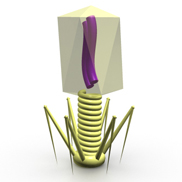
bacteriophage
A bacteriophage is a type of virus that infects bacteria. In fact, the word "bacteriophage" literally means "bacteria eater," because bacteriophages destroy their host cells. All bacteriophages are composed of a nucleic acid molecule that is surrounded by a protein structure. A bacteriophage attaches itself to a susceptible bacterium and infects the host cell. Following infection, the bacteriophage hijacks the bacterium's cellular machinery to prevent it from producing bacterial components and instead forces the cell to produce viral components. Eventually, new bacteriophages assemble and burst out of the bacterium in a process called lysis. Bacteriophages occasionally remove a portion of their host cells' bacterial DNA during the infection process and then transfer this DNA into the genome of new host cells. This process is known as transduction.
Further Exploration
Concept Links for further exploration

















